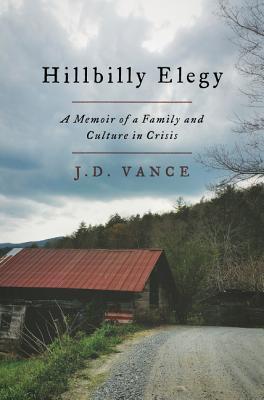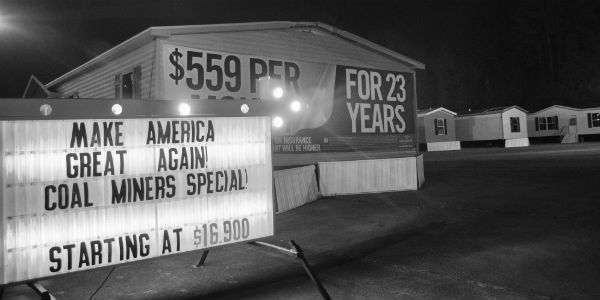Book review | Hillbilly Elegy: A Memoir of a Family and Culture in Crisis, by J D Vance
In Hillbilly Elegy: A Memoir of a Family and Culture in Crisis, former marine and Yale Law School graduate J.D. Vance offers a personal account of growing up in – and eventually leaving – an impoverished white working-class ‘hillbilly’ community experiencing social and economic crisis. While the book has been praised for offering insights into why Donald Trump proved so attractive to the US white working class, Peter Carrol is less convinced by Vance’s broader and overtly politicised sociological analysis of his community. Nonetheless, he finds the vividness of Vance’s unflinching recollections compelling.
Hillbilly Elegy: A Memoir of a Family and Culture in Crisis. J.D. Vance. HarperCollins. 2016.
 When J.D. Vance was eleven, his drug-addicted mother chased him across farmland after threatening to murder him by crashing the car, with Vance taking refuge in a stranger’s house until the police arrived. When he turned eighteen, Vance managed another dramatic escape, this time from his dysfunctional ‘hillbilly’ background, joining the marines to serve in Iraq, going on to earn a law degree from Yale and eventually landing a lucrative job far away from his family.
When J.D. Vance was eleven, his drug-addicted mother chased him across farmland after threatening to murder him by crashing the car, with Vance taking refuge in a stranger’s house until the police arrived. When he turned eighteen, Vance managed another dramatic escape, this time from his dysfunctional ‘hillbilly’ background, joining the marines to serve in Iraq, going on to earn a law degree from Yale and eventually landing a lucrative job far away from his family.
The 32-year-old Vance’s memoir chronicles this impressive rise from the poor, white working-class communities of Scotch-Irish descent who live along the Appalachian Mountains in such states as Alabama, Ohio and Kentucky. Vance calls these people ‘hillbillies’, and his book comes as these communities are living through social and economic crisis. Suffering at the sharp end of the USA’s rapid deindustrialisation, the well-paid, skilled jobs of previous generations have disappeared, leaving towns and cities in permanent recession and mired in addiction and poverty. Vance paints a captivating portrait of his formative environment: as he puts it, of ‘what it feels like to have poverty and addiction hanging round your neck from birth’.
In addition to her crippling addictions, Vance’s mother moves through a conveyor belt of partners, regularly uprooting his family throughout his childhood. When Vance’s mother is incapacitated or he is removed from her care, he is raised by his alcoholic grandfather and his violent, gun-toting grandmother. Their deeply disturbing behaviour is unsparingly detailed: at one point Vance’s grandparents threaten to murder a shop assistant who asks a cousin not to play with an expensive toy, while in one of the many acts of violence recounted, his grandmother douses his grandfather in petrol then sets him on fire when he returns home drunk. Amongst Vance’s immediate and extended family, marital breakdown, adultery, alcoholism and sexism are all normalised everyday behaviour.
Vance identifies a number of broader trends that are rotting the US white working class from the inside. A work culture where parents fail to turn up to their jobs and barely do anything while there, fostering a culture of long-term unemployment alongside welfare dependency. Widespread financial recklessness, where families earning an annual household income of $100,000 (£81,000) are ruined by excessive debt. Vance writes: ‘We purchase homes we don’t need, refinance them for more spending money, and declare bankruptcy, often leaving them full of garbage in our wake. Thrift is inimical to our being.’
Since its autumn publication, Hillbilly Elegy has been praised for its insights into why Donald Trump proved so attractive to the US white working class in the presidential election of November 2016. Aside from the fact that it is easy to see how many ‘hillbillies’ could embrace Trump – a xenophobic misogynist with an unpredictable temperament – as one of their own, Vance identifies how a common sense of victimhood and tendency to blame others was successfully tapped during Trump’s campaign. Foreigners, the government, ‘coastal elites’ are all seen as responsible for the predicament of the ‘hillbillies’, who, Vance argues, blame everyone apart from themselves.

A trailer home dealership in Middlesboro, Kentucky, November 2016. Photo: Don Sniegowski via a CC-BY-NC_SA 2.0 licence
Not all of Vance’s memoir is as convincing as his personal reflections, however. In one sentence he extols the USA as the ‘greatest country in the world’, while he later laments the fact that it is a nation with ‘no heroes’ to inspire its citizens. Vance chastises his own community for their addiction to debt and materialism, but continuously advocates a kind of aggressive pursuit of wealth as central to his understanding of realising the ‘American Dream’.
Vance claims that drug addicts are solely responsible for their plight, apparently absolving successive US governments who have pursued a war on drugs that has criminalised whole swathes of society and the pharmaceutical corporations that aggressively market the painkillers that are fuelling the prescription drug epidemic. He makes glib criticisms of the Democrat party as enablers of dependency through their welfare programme, ignoring the fact that in the USA the majority of welfare recipients are actually in work on poverty wages.
Vance idolises his grandmother, ‘the nicest person in the world’, despite her every other sentence seeming to contain an insult or a threat of violence. (Vance seems to have a soft spot for women who trade in personal insults: he later describes how he falls for his partner when she tells another person in a bar that they have a small head.) When he is studying as an undergraduate at Ohio State, he describes how the criticisms of US foreign policy in the Middle East by a ‘dipshit’ with a ‘spotty beard’ are the catalyst for him to condense his studies so he can graduate in under two years, presumably to avoid any further encounters with those who challenge his worldview.
At the beginning of the book, Vance describes a ‘hillbilly’ code of silence, which forbids family members discussing their problems with outsiders. By refusing to acknowledge their behaviour, Vance feels that his community are hiding their vices while leaving outsiders ignorant of the extent of the problem. In this sense, by shattering the ‘hillbilly’ omerta on the pages of his book, he has done a valuable service by shining a light on a dark corner of US society. But by extending these observations to generalise an entire population, often with selective and cursory use of external evidence, Vance is guilty of overreach in his wider analysis.
Vance’s unflinching and painful account of the life he has left behind deserves rich praise, as does Vance’s achievement to overcome such huge disadvantages to achieve academic and career success. But while Vance’s personal recollections are compelling, his broader sociological analysis is often too broad and feels overtly political. The latter is likely to be intentional: Vance’s uncritical patriotism and his commitment to the politics of personal responsibility will prove great assets within the Republican party when he embarks on his inevitable political career.
This review represents the views of the author and not those of Democratic Audit. It first appeared at the LSE Review of Books.
Peter Carrol is a Media Relations Officer at LSE and MSc graduate in Politics and Communication. Read more by Peter Carrol.





 Democratic Audit's core funding is provided by the Joseph Rowntree Charitable Trust. Additional funding is provided by the London School of Economics.
Democratic Audit's core funding is provided by the Joseph Rowntree Charitable Trust. Additional funding is provided by the London School of Economics.
It’s DEMOCRATIC Party, not “Democrat Oarty.”
Sorry, Al, you’ve lost me.